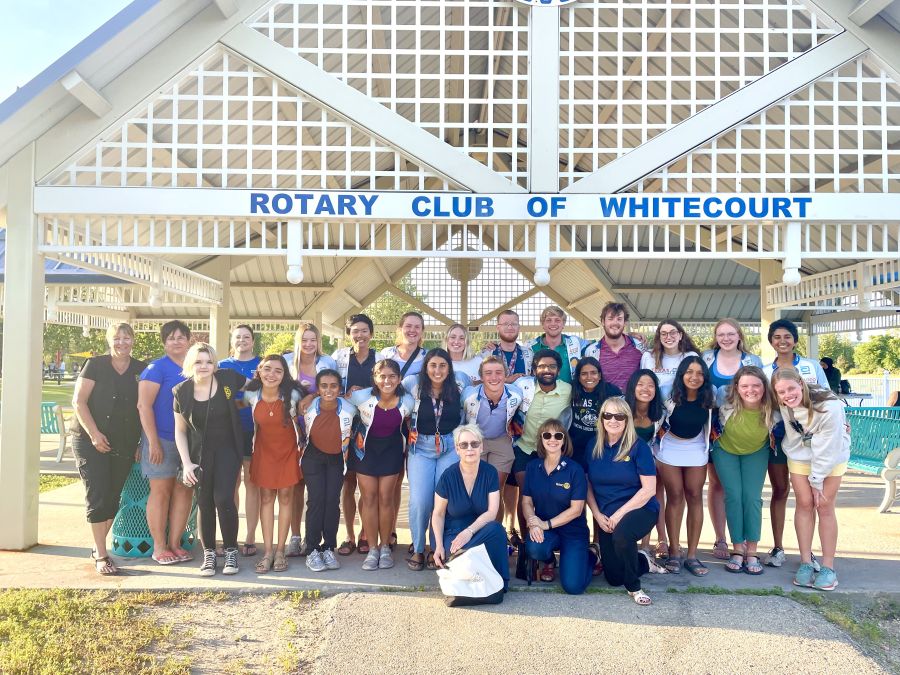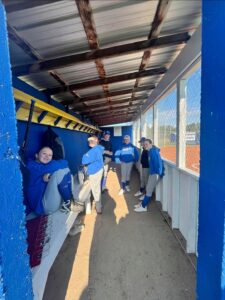Named after the distance between Anchorage, Alaska and Austin, Texas, the Texas 4000 is the longest annual charity bike ride on the planet. Each year, students from the University of Texas lace up their sneakers, fill their water bottles, top up the air in their bike tires and hit the pavement for a massive mission to cultivate leaders, fight against cancer and unite communities along the way.
On July 23, a large group of roughly 70 bikers arrived in Whitecourt. “They’ve done this previously, and the Rotary Club of Whitecourt had hosted them. When they came through Whitecourt, they enjoyed it, so they reached out to the Rotary Club and asked if they would host again, and the Rotary Club connected them to the Cancer & Wellness Society,” explained Aimee Grierson, volunteer with the Cancer and Wellness Society.
Bikers had to raise at least $4,500, ride two thousand training miles with the team, and volunteer more than 50 hours in their community to participate in the event. “The money they each fundraised goes towards foundations that deal with cancer research. The volunteer hours they do can be wherever they prefer, but often they are related to helping cancer patients and locals in their community,” explained Grierson.
On Saturday evening, the Cancer & Wellness Society and the Rotary Club of Whitecourt hosted the bikers with hotel rooms at the Microtel and fed them a hearty meal. “Sometimes they will have families that will take them into their homes, but with COVID, that’s changed. So, we hosted them in the Microtel. We gave them lots of carbs and nourishment that they need while doing this really long bike ride.”
Grierson said that a big part of the trip was about meeting and talking with community members. “They like to meet community members and see what communities have to offer, so we thought that Rotary Park was a really good place to host them,” she said. As a society volunteer, Grierson said the stop-over is awesome. “Although they are not from here, they bring that sense of community, and it brings community members out, and it also reminds them that there are foundations in Whitecourt that can help people going through similar things. It’s a reminder that we are all in this together.”
The ride takes students roughly 70 days from start to finish, with each cycling at least 70 miles daily. There are three routes taken from Texas to Alaska (Sierra, Rockies, Ozarks), with a group cycling each, and the group that stopped in Whitecourt was the Ozarks group. “It’s a long time to spend on a bike,” said Grierson. “They have a support van that drives behind them and provides medical aid as they need it, but these community stops are meant to give them a rest period to connect with people and feel like they are part of something before they get back on their bikes.”
Biker Dominic Beck said he really liked getting to stop in Whitecourt, though they experienced a rough entry. Ten or so kilometres outside of town, the group was struck by hail from a passing thunderstorm. “Thankfully, it cleared up quickly, and it was a beautiful ride into Whitecourt,” he recollected. “We do this because there are people who suffer way more than we ever will on a bike no matter how much our butts and legs hurt. They are going through chemo and radiation, many of whom are family members and friends we think about daily when we get on our bikes.”
Beck said that the group has seventy stops, one for each day, but those stops often happen at obscure stops along the way. Community visits happen about forty times, as they did in Whitecourt, where they are hosted and greeted. “We get to connect with and learn about and chat with people in those communities. But it’s almost uncountable how many people we speak to when you consider the number of people we meet at gas stations or along the way somewhere. Sometimes we stop at a stop light, and someone will hand us a $20 bill through their window and wish us well. We’ve been touched by generosity too many times to count.”
When asked how it was to start the trek fifty days ago, Beck said their university alumni gave them advice but chuckled that it didn’t quite pan out the way they said. “They say that the first two weeks are the hardest, and they are wrong because every day is kind of the hardest, ha-ha. The hardest part is getting into the routine and getting into the mindset for biking. It’s strange to think about how hard it was back then because now I just get on my bike and go. You stop dreading the tough days and start living in the moment a little bit more.”
With the end of their ride coming in twenty days, Beck said the riders are somewhere between bitter and sweet. “We are heartbroken for it to end but are also looking forward to our warm beds.” To follow along on the journey of the Texas 4000 bikers or to donate, visit www.texas4000.org.








More Stories
Community spirit shines at large-scale youth baseball event
Birthday party chaos sung beautifully by Pumpjack Players’ youth in spring musical
Gearing up for another season of cars, cruising and camaraderie